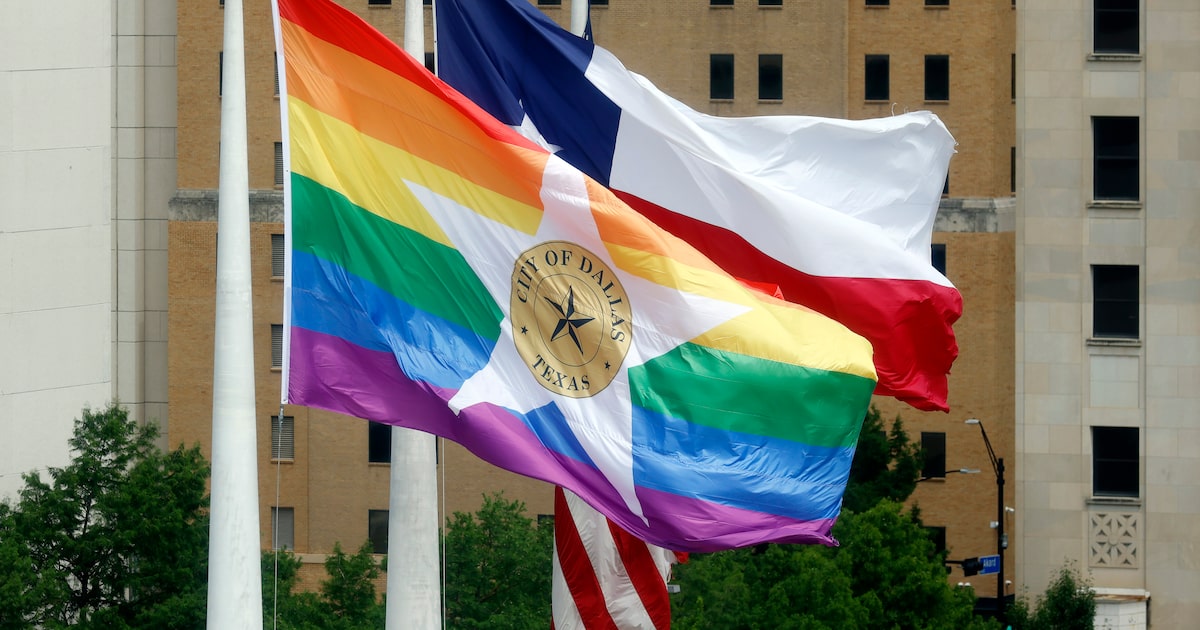Pride Month has ended, and I’m filled with gratitude that the city of Dallas once again raised its Pride flag over City Hall — continuing a powerful tradition now in its fifth year.
Dallas remains the only city in America with an officially sanctioned Pride version of its city flag, approved by the City Council after a nine-year effort led by Pam Gerber and others who navigated it through the city manager’s office, the mayor’s office, and ultimately to a City Council vote.
In May 2021, the Dallas City Council voted unanimously to allow City Hall and other city-run facilities to fly the flag during June. The design, featuring the city seal over the rainbow’s six colors, symbolizes the city’s commitment to equality, inclusion and respect.
“The City Council believes it is important to communicate its support for diversity, inclusivity, equality, and respect in our city during Pride Month,” members said in a June 2020 written statement.
Opinion
A Dallas Morning News’ column, “Should Dallas really fly the Pride flag?” by David J. Kohl on July 1, illustrates the challenges faced by members of the LGBTQ community. Taking down the Pride flag at City Hall under the stated reason of “recognizing everyone from all backgrounds” may seem neutral on the surface, but it carries significant social, political and emotional implications.
While the intention may be framed as “unity,” removing the Pride flag often feels like erasure to LGBTQ individuals. It can signal that their identity, history and struggles are no longer worth publicly acknowledging.
The Pride flag is not about excluding others. It is about making space for those who have historically been excluded. Removing it, even if motivated by neutrality, implies a false equivalence between visibility and favoritism. Removing the flag during Pride Month can appear as a political concession to intolerance, not a gesture of fairness.
The Rainbow flag, now widely recognized beyond the LGBTQ community, signals a “safe and welcoming space” for all — found in churches, schools, businesses and government buildings alike.
Kohl asked why other community flags aren’t flown over City Hall. My response? Let’s make it happen. I’d love to see a St. Patrick’s Day flag — Hurá! — or an Indigenous Peoples flag — Nehiyaw! Asian and Pacific Islander, Hispanic, Jewish flags — why not? Every community deserves a moment to be honored. Thanks to Gerber, Adam Medrano, Omar Narvaez, Patti Fink and Erin Moore’s nine-year persistence, the path is now clearer for others to follow.
The assumption that flying the Pride flag somehow excludes other non-LGBTQ communities reminds me of when the “Black Lives Matter” phrase was twisted into “All Lives Matter.” The phrase “All Lives Matter” is offensive and dismissive in the context of the Black Lives Matter movement because it ignores or minimizes the specific injustices and systemic racism that Black people face.
The BLM movement was created to spotlight the fact that Black lives have been devalued in American society, especially in the context of police violence, mass incarceration, and systemic racism. The LGBTQ community experiences similar diminishment and erasure.
Saying “Black Lives Matter” is not saying other lives don’t matter. It is saying Black lives matter too, especially in a society where they often have not. When someone says “Black Lives Matter” and the response is “All Lives Matter,” it shifts focus away from urgent racial issues, dismisses the specific problem being addressed, and dilutes the message, making it harder to address systemic problems that uniquely affect Black communities.
Flying the Pride flag over City Hall says, “LGBTQ Lives Matter.” Asking to remove the Pride flag, so as to better represent all communities, feels a bit like, “All Lives Matter.”
We need to remember: LGBTQ people still face widespread discrimination, making public symbols of support not only meaningful but necessary. The argument of “recognizing everyone” risks ignoring those who still need allyship the most.
The Pride flag stands as a visible, peaceful act of resistance against rising anti-LGBTQ rhetoric and policies, while it reflects the city’s core principles of freedom, justice, and equality for all residents. Rather than remove the Pride flag in the name of broader inclusion, let’s use this opportunity to educate on the importance of representation, the meaning of the flag, and how celebrating one group uplifts us all.
In a time when political leaders seek to erase the LGBTQ community, Dallas’s choosing to fly its Pride flag is a bold affirmation of our shared values of inclusion and respect — something in which every Dallas citizen can take pride.
Robert Emery is a Dallas resident.
